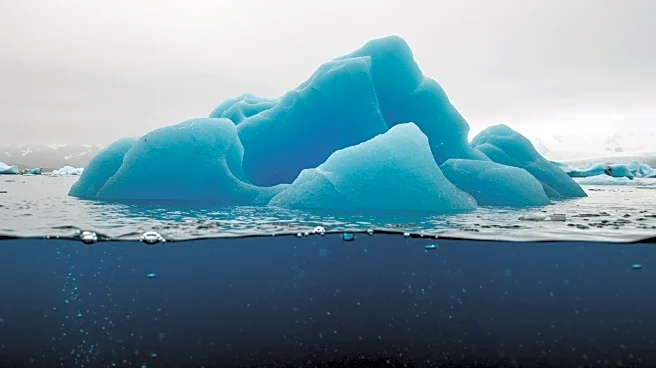What's Happening?
In a significant scientific discovery, researchers have documented an unusual event beneath Greenland's ice sheet, where a subglacial lake erupted in 2014. This phenomenon, detailed in a study published by Nature Geoscience, involved a sudden and forceful release of meltwater through the ice, creating a large crater. The event defies previous understandings of subglacial lake drainage, which typically occurs gradually. The eruption was captured via satellite imagery and has prompted scientists to reconsider the dynamics of Greenland's ice sheet. Malcolm McMillan from Lancaster University, a key researcher, noted the unprecedented nature of this event, which suggests that the ice sheet's behavior is more complex and unpredictable than previously thought.
Why It's Important?
The discovery of this meltwater eruption has significant implications for global climate concerns. Greenland's ice sheet is the second largest in the world, and its melting contributes to rising sea levels. The event highlights the vulnerability of the ice sheet and the potential for rapid, unforeseen changes in its dynamics. As global temperatures rise due to human-induced climate change, the ice sheet's stability is increasingly threatened. This could accelerate ice loss, exacerbating sea level rise and impacting coastal communities worldwide. The findings underscore the need for urgent climate action and further research into the behavior of subglacial lakes and their impact on ice dynamics.
What's Next?
The scientific community is now tasked with further investigating the complexities of Greenland's ice dynamics. While geoengineering solutions to slow polar ice melting are being explored, they remain in the early stages of development. In the meantime, the data from this eruption will inform future climate policy and strategies to mitigate ice loss. Understanding the potential for rapid changes in subglacial lakes is crucial for predicting future ice dynamics and addressing the associated risks. As the climate continues to warm, scientists must work to decipher these changes to protect the planet's ice sheets and coastal regions.
Beyond the Headlines
This discovery also raises questions about the broader implications of climate change on polar regions. The unpredictability of ice dynamics could lead to more frequent and severe climate-related events, challenging existing models and predictions. The event serves as a reminder of the urgent need for comprehensive climate policies and international cooperation to address the root causes of climate change and its impacts on vulnerable ecosystems.









